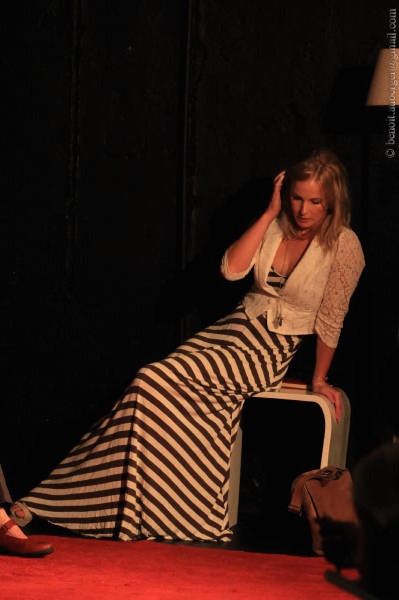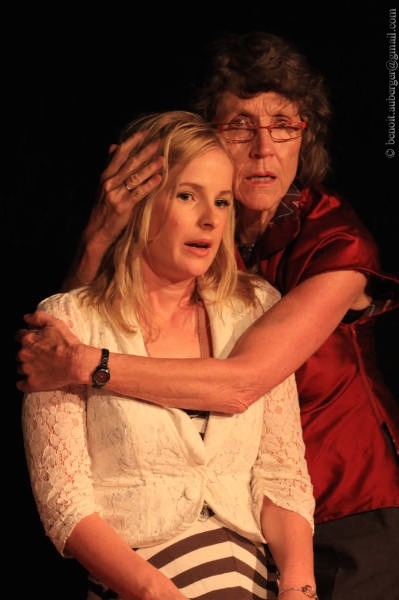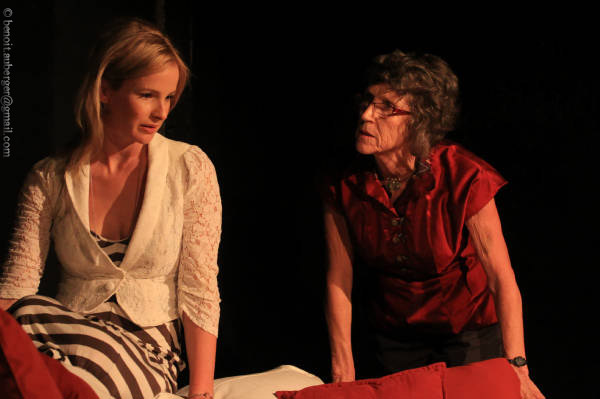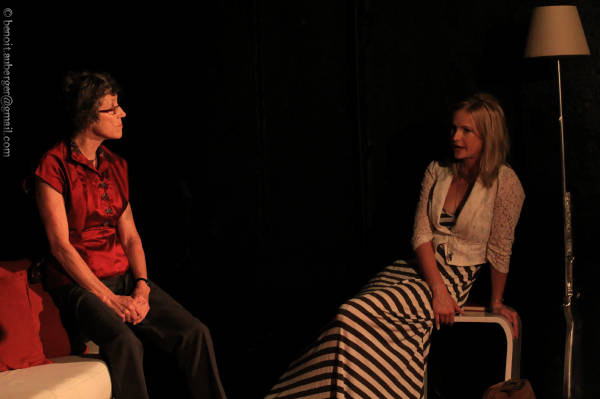GALLERY





REVIEWS
love child
Samela Harris, February 29, 2012
The Advertiser
THE sight lines are dire. The stage is miniscule. The venue is subterranean. But this is one of those exquisite theatrical treats which are thrown up by Fringes.
This one is an Early Worx production directed by Charles Sanders. It's a script by Joanna Murray-Smith depicting a taut, reserved middle-aged woman being confronted for the first time by a fanciful soapie star actress who purports to be the daughter she bore in shame and secrecy at the age of 17.
It's a beautifully penned script, typica Murray-Smith, richly referenced and lightened by darts of quirky humour.
If at first it seems to reveal the inner lives and thoughts of its two protagonists, it then veers and swerves and makes emotional u-turns so that it surprises in all directions.
If the script is clever, the actors are brilliant - tour de force performances from the wonderful senior player Chrissie Page and dazzling emerging talent Anna Cheney. It's so good it's worth seeing twice.
ADELAIDE FRINGE: A stellar production of Joanna Murray-Smith’s play and a must-see piece of Fringe theatre
Glen Christie, Friday, March 02, 2012
Early Worx in Theatre and Art, under Artistic Director Charles Sanders, continues to go from strength to strength. Following a powerful opening night of Queer – The Wicked Webs We Weave, this stand-out young company followed up with Love Child by Joanna Murray-Smith (The Female of the Species).
Love Child opens with Billie (Anna Cheney) addressing the audience, describing her fairytale, romanticised vision of the first meeting with her biological mother, Anna. It is a detailed account, complete with music, echoed by Anna (Chrissie Page).
This seamlessly segues into reality, as Billie arrives at Anna’s and they begin a journey of discovery of who they are, who Anna was – both before and after Billie’s birth and surrender – and who she is now.
There is a beautiful, touching and funny synchronicity between Cheney and Page. They conduct themselves with decorum and aplomb, initially. They have us laughing out loud at the awkwardness of this first meeting. With each perceived similarity – such as Billie being an actor/Anna a film editor – there is a witty collapse into the reality of each other’s perception of their opposite.
Anna Cheney is a perfect blend of blonde ditz and hidden, shrewd intellect. Jackie Page is a human contradiction – being cold and aloof, while still finding moments of great warmth and sensitivity, hidden under decades of repressed pain. Set only with a designer couch and lamp, together, Cheney and Page command the small stage of Higher Ground’s Art Base.
The final twist and the bookend monologue from Anna round out a faultless performance about love, family, feminism and femininity. Charles Sanders has directed a must-see piece of Fringe theatre.
Rating: Five stars
LOVE CHILD BY JOANNA MURRAY SMITH
March 1, 2012 by Prerna Ashok
FringeReview
Low Down
Billy, a young up and coming bubbly actress has waited her whole life to find her real mother, Anne. However, the two have very strong personalities and often clash over opinions and ideas. Billy is a 21st century woman who feels she has achieved a balanced life with her career and desire for a family. Anne on the other hand is stubborn feminist who has never wanted a family and hides her past mistakes under a cool and collected façade. Both characters break each other down and the final twist in the plot takes this play in a new direction and at a new level.
Review
The story starts with a lyrical soliloquy by Billy (played by Anna Cheney) that sets the scene and provides an insight into what it is about. When the play starts, the differences in characters and personalities is palpable—Billy wants to know everything about Anne’s (Chrissie Page) past, but Anne deflects her questions and hides the truth for as long as possible. They make small talk and exchange awkward pleasantries at first, but Billy’s persistence pays off and slowly the story is revealed. The story twists and turns through darkness and light, the characters become stronger and battle each other as they desperately seek control over the other and their emotions. As the story climaxes to what seems to be a satisfying, happy ending, the final twist in the tale is revealed, leaving the audience gasping and leaning forward to learn more.
This is an extremely sophisticated, complex dialogue and story that is played out between two women of different generations and personalities. The performances were stupendous and engaging. The characters, although at extreme ends of the spectrum, were relatable and as a result, likeable for different reasons. They are humorous, passionate, confident women who break each other down as they find each other’s weak spots. The characters encompass all aspects of what it is to be a woman and the choices women make. The story is poignant, intense, and engaging, but it is really the twist at the end that hooks and drags you into their world.
Page and Cheney give tangible performances and toy with the audience’s minds and expectations. They worked in harmony, reacting and responding to each other as any mother and daughter would. Both developed their characters with ease and finesse that was barely perceptible, but the changes in character evident. The set was minimal, but reflected the emptiness in Billy and Anne’s life that they later filled with larger than life performances. The lighting was used effectively to highlight the nostalgia and trances, softening each character and exposing their vulnerability.
This was an exceptional play and words cannot do it justice. Theatre of this kind is rare—the audience left speechless, and in awe of the powerful performances and astounding spectacle they just witnessed.

